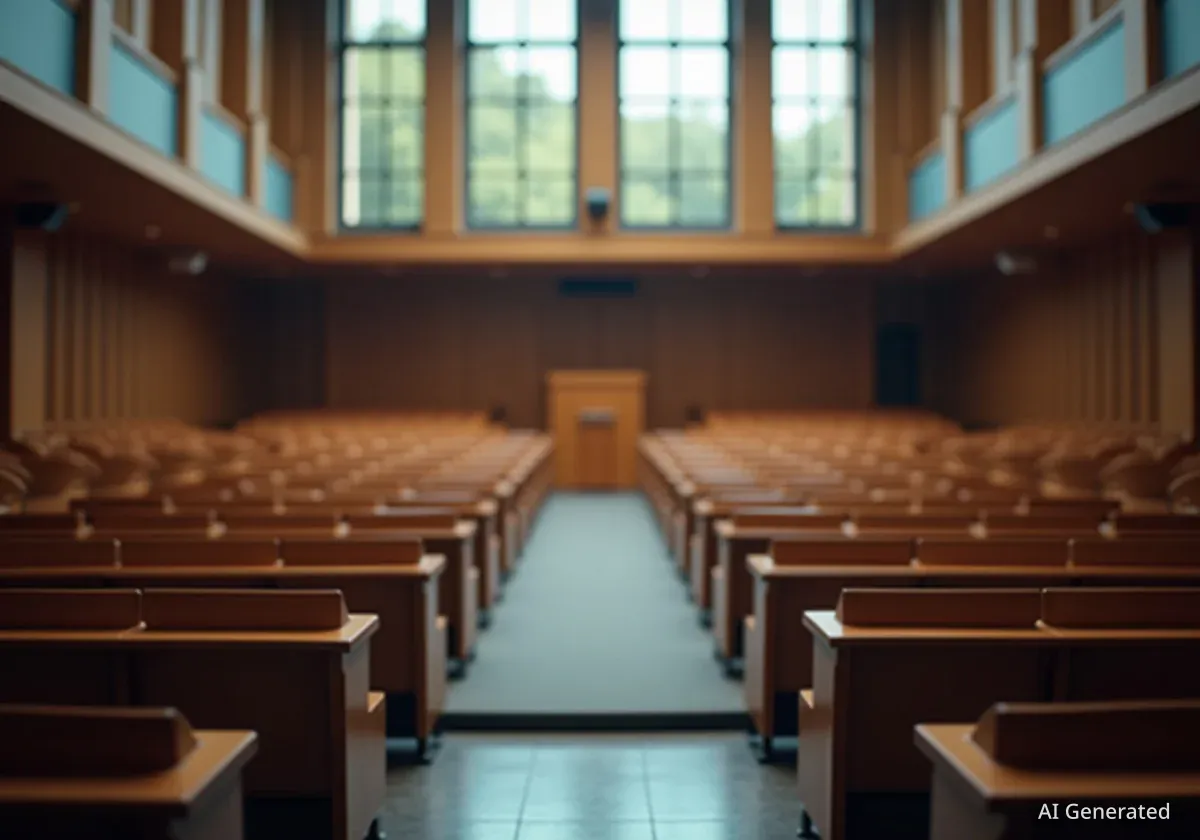The University of Virginia's Faculty Senate has formally called for the immediate resignations of Rector Rachel Sheridan and Vice Rector Porter Wilkinson. The move follows a public dispute with former President Jim Ryan, who alleges the pair orchestrated his ouster this summer in collaboration with Trump administration officials.
In a decisive vote of 41 to 17 with two abstentions, faculty leaders passed a resolution demanding the change in leadership, citing a profound loss of trust and a lack of transparency from the university's governing Board of Visitors.
Key Takeaways
- The UVA Faculty Senate voted 41-17 to demand the resignation of Rector Rachel Sheridan and Vice Rector Porter Wilkinson.
- The vote was prompted by a letter from former President Jim Ryan alleging he was forced out in a politically motivated "coup."
- Ryan claims Sheridan worked with Trump administration officials to remove him over the university's diversity, equity, and inclusion (DEI) policies.
- Sheridan asserts Ryan resigned voluntarily under pressure from a Department of Justice investigation that threatened millions in federal funding.
- The resolution also calls for an immediate halt to the search for a new university president.
A Public Clash Over a Private Departure
The turmoil at the University of Virginia escalated following the release of conflicting letters from former President Jim Ryan and Rector Rachel Sheridan. Each provided a starkly different narrative of the events leading to Ryan's departure over the summer.
Sheridan's letter to the faculty claimed that Ryan chose to resign after being informed of a Department of Justice investigation into the university's diversity, equity, and inclusion (DEI) initiatives. According to her account, Ryan was convinced that his continued leadership would jeopardize millions of dollars in federal funding and that he was stalling efforts to dismantle the policies in question.
However, just one day later, Ryan released his own detailed letter, presenting a dramatically different version of events. While he did not deny the existence of a DOJ investigation or the potential financial risk, he accused Sheridan of orchestrating his removal. Ryan wrote that Sheridan worked "behind the scenes" with DOJ officials to make him a scapegoat rather than engaging in good-faith efforts to resolve the issue with federal officials.
A History of Leadership Disputes
This is not the first time the UVA Faculty Senate has called for a rector's resignation over the removal of a president. In 2012, a similar demand was made when Rector Helen Dragas led an effort to oust then-President Teresa Sullivan. While Sullivan was ultimately reinstated, the event left a lasting mark on the university's governance dynamics.
Faculty Responds with No-Confidence Vote
The conflicting accounts fueled a growing sense of unrest among faculty, who had been seeking answers for months. The Faculty Senate meeting on Friday became the forum for this frustration, culminating in the resolution demanding resignations.
Jeri Seidman, a commerce professor and the chair of the Faculty Senate, addressed the lack of communication from the university's leadership during the meeting.
"Since July, we have called — in emails, in person and in meetings — for the rector and the vice rector to come and answer questions. This resolution deals with the fact that that hasn't happened until last night. Last night, only indirectly through the faculty representative of the board, only in writing and only when we had put a call for resignation on the agenda, we got some answers."
The resolution passed by the Senate states that UVA deserves "leadership who merit the trust and confidence of the faculty, staff, students, and alumni of the University." Many faculty members argued that the actions described in Ryan's letter, if true, represented an unacceptable politicization of the state's flagship public university.
Calls to Halt the Presidential Search
Beyond the demand for resignations, the faculty resolution also insists that the ongoing search for a new university president be halted immediately. This sentiment was echoed by Virginia's incoming Democratic governor, Abigail Spanberger, who has also requested a pause in the process.
By the Numbers: The Vote
- For Resignation: 41
- Against Resignation: 17
- Abstentions: 2
This vote represents a significant majority of the Faculty Senate expressing a lack of confidence in the current leadership of the Board of Visitors.
A Politically Charged Environment
Both Sheridan and Vice Rector Porter Wilkinson are appointees of Republican Governor Glenn Youngkin and have strong ties to Republican circles in Washington. This has led to accusations that Ryan's ouster was part of a broader political agenda.
Hudson Golino, a psychology professor, described the situation as a "hostile takeover" during the Friday meeting.
"This university has suffered a coup, this university was part of a hostile takeover by private individuals, and this is a public institution in the state of Virginia. We should never allow such a thing to happen."
Some faculty senators urged caution, suggesting a vote for resignation would be a "knee-jerk response" to the flood of new information. A motion to delay the vote failed, with others arguing that Sheridan's letter was a strategic attempt to preempt the Senate's resolution.
"The only reason Sheridan came clean on her version of events is because she knew this resolution was coming," said Spanish professor Anne Garland Mahler. "That's the only reason we're getting any of this information."
As the university community grapples with the fallout, the future of its leadership remains uncertain. The Board of Visitors has yet to formally respond to the Faculty Senate's demands, leaving a significant power vacuum at one of the nation's most prestigious public universities.





